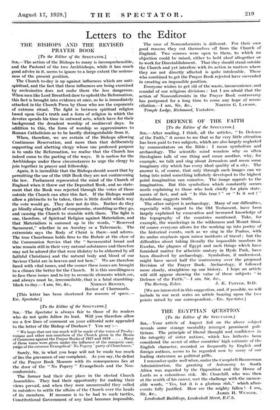IN DEFENCE OF THE FAITH
[To the Editor of the SPECTATOR.] SIR,—After reading, I think, all the articles, " In Defence of the Faith," it seems to me that so far very little attention has been paid to two subjects, which are also largely neglected by commentators on the Bible : I mean symbolism and archaeology. The scientific mind wonders why so often theologians talk of one thing and mean another, why, for example, we talk and sing about Jerusalem and mean some imaginary city which has every ideal quality of a city. The answer is, of course, that only through such images can we bring into mind something infinitely developed to the highest point imagination can conceive. The image appeals to the imagination. But this symbolism which constantly occurs needs explaining to those who look chiefly for plain state- ments of fact, and ask " Is this true ? " or " Is it not ? Symbolism suggests truth.
The other subject is archaeology. Many of our difficulties, especially with regard to the Old Testament, have been largely explained by excavation and increased knowledge of the topography of the countries mentioned. Take, for example, the wanderings in the wilderness and Mount Sinai. Of course everyone allows for the working up into poetry of the historical events, such as we sing in the Psalms, with its undue emphasis upon minor incidents of travel ; but the difficulties about taking literally the impossible numbers in Exodus, the plagues of Egypt and such things which have furnished matter for atheistic oratory in Hyde Park, have been dissolved by archaeology. Symbolism, if understood, might have saved half the controversy over the proposed Revision of the Prayer Book. Archaeology, if followed more closely, straightens up our history. I hope an article will still appear showing the value of these subjects in Defence of the Faith."—I am, Sir, &c., [We are interested in this suggestion, and, if possible, we will include in our next series an article bearing upon the two points raised by our correspondent.—En. Spectator.]
































 Previous page
Previous page